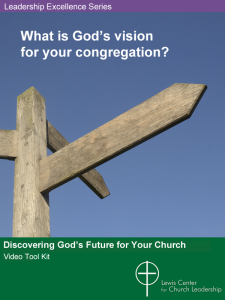Drawing on his experience leading a strategic planning process, Pastor Myung Sun Han identifies key lessons to keep a church-wide planning exercise positive, productive, and Spirit-led.
What makes a strategic planning process fruitful? The church I serve recently undertook a long-range planning exercise to create a clear mission statement, identify key priorities, and develop plans for accomplishing our goals. This experience revealed some key lessons for effective planning in congregations.
Focus the energy forward. In the first session of vision discernment, people began to pour out what had not worked in the past. They complained of frequent pastoral changes, inappropriate behavior by some members, and lack of denominational support. Even though the aim of the meeting was vision discernment, it fell into a time for complaints.
The discernment of a vision does not take place in a vacuum but, rather, in a messy place filled with history, problems, and relationships. No leader can resolve all problems, but leaders can begin to shift the energy more toward vision. Otherwise, all the organizational space is filled with the problems. Problems don’t disappear, but they lose their capacity to consume all congregational energy.
Identify key disparities. In all of our meetings, members passionately agreed with the need for a strong outreach program. But we had a hard time answering the question, “To whom, specifically, are we going to reach out?” Our idea of outreach was very vague. We did not have a clear sense of what kind of people we were targeting.
But the Planning Committee’s review of community profile data revealed major differences between our church and community. Both the racial and age composition of the congregation was quite different from that of the community. For example, our community has one of the fastest-growing Latin American populations in the state, but it is not represented in our church. These racial and age disparities helped us see the weakness of our past outreach efforts.
Claim the unique calling of your context. While we were struggling to identify a target group, we discovered another disparity. On the one hand, our community is affluent and stable. It is one of the wealthiest in the state. On the other hand, we know that our community is filled with people wounded by their problems and hurting. It is easy for the well-to-do to feel self-sufficient without God; yet their struggles belie that feeling. In our discussions, one member shared his family’s experience of divorce. He shared how difficult it was and how desperate they were for any kind of help. Most of all, he said, living in such a stable and affluent area makes it very hard to ask for help.
Such sharing stimulated other members to tell their own experiences of personal and family problems. As they shared their sensitive problems, we all could see that there are so many people in our town who need help but have a hard time finding such help. So, in the next meeting, we created the first part of our mission statement: A Christian community where a broken heart is welcomed, healed, and transformed into.… Our next step was to complete the sentence to reflect the goal of such transformation. We now see that we are wounded people surrounded by wounded people, and our goal is to equip ourselves to be a more hospitable church to such people of all ages and races.
Acknowledge the movement of the Spirit. Strategic planning is often seen as a technical and strategic discipline, but it is also a spiritual discipline. We did our best to understand the current state of our church and community as accurately as possible. Dealing with these facts made the visioning process look technical. However, whenever we engaged in conversations with one another, we felt a strong presence of the Holy Spirit. Especially in the last session when we shared our brokenness together, I could feel that our visioning process had moved into a deeply spiritual endeavor.
Allow enough time for prayer and discernment. Planning takes much more time than I had anticipated. After three months, we still had no mission statement or the prospect of one any time soon. One of the main factors that delayed the process from my perspective was broken relationships. I wish I had spent more time in prayer and discernment prior to the visioning process. As a new pastor to a declining congregation, I reacted from my own sense of urgency. I did not allow myself to stay still long enough before God in prayer and meditation.
We now ask our entire congregation to pray for our planning process so that the final vision will not be ours so much as God’s.
 Related Resources
Related Resources
- Take the Next Step: Leading Lasting Change in the Church by Lovett H. Weems Jr.
- Discovering God’s Future For Your Church, a video tool kit for congregational visioning
If you would like to share this article in your newsletter or other publication, please review our reprint guidelines.







